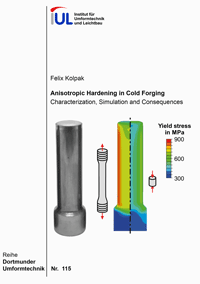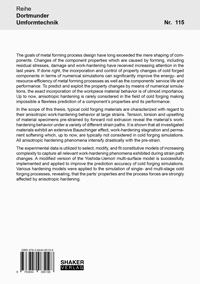
Shop : Details
Shop
Details
48,80 €ISBN 978-3-8440-8519-8Softcover204 pages105 figures291 g21 x 14,8 cmEnglishThesis
March 2022
Felix Kolpak
Anisotropic Hardening in Cold Forging
Characterization, Simulation and Consequences
The goals of metal forming process design have long exceeded the mere shaping of components. Changes of the component properties which are caused by forming, including residual stresses, damage and work-hardening have received increasing attention in the last years. If done right, the incorporation and control of property changes of cold forged components in terms of numerical simulations can significantly improve the energy- and resource-efficiency of metal forming processes as well as the components' service life and performance. To predict and exploit the property changes by means of numerical simulations, the exact incorporation of the workpiece material behavior is of utmost importance. Up to now, anisotropic hardening is rarely considered in the field of cold forging making impossible a flawless prediction of a component's properties and its performance.
In the scope of this thesis, typical cold forging materials are characterized with regard to their anisotropic work-hardening behavior at large strains. It is shown that all investigated materials exhibit an extensive Bauschinger effect, work-hardening stagnation and permanent softening which, up to now, are typically not considered in cold forging simulations. All anisotropic hardening phenomena intensify drastically with the pre-strain.
The experimental data is utilized to select, modify, and fit constitutive models of increasing complexity to capture all relevant work-hardening phenomena exhibited during strain path changes. A modified version of the Yoshida-Uemori multi-surface model is successfully implemented and applied to drastically improve the prediction accuracy of single- and multi-stage cold forging simulations.
In the scope of this thesis, typical cold forging materials are characterized with regard to their anisotropic work-hardening behavior at large strains. It is shown that all investigated materials exhibit an extensive Bauschinger effect, work-hardening stagnation and permanent softening which, up to now, are typically not considered in cold forging simulations. All anisotropic hardening phenomena intensify drastically with the pre-strain.
The experimental data is utilized to select, modify, and fit constitutive models of increasing complexity to capture all relevant work-hardening phenomena exhibited during strain path changes. A modified version of the Yoshida-Uemori multi-surface model is successfully implemented and applied to drastically improve the prediction accuracy of single- and multi-stage cold forging simulations.
Keywords: Plasticity; Bauschinger effect; Cold Forging
Available online documents for this title
DOI 10.2370/9783844085198
You need Adobe Reader, to view these files. Here you will find a little help and information for downloading the PDF files.
Please note that the online documents cannot be printed or edited.
Please also see further information at: Help and Information.
Please also see further information at: Help and Information.
| Document |  | Document | ||
| Type |  | |||
| Costs |  | 36,60 € | ||
| Action |  | Purchase in obligation and download the file | ||
| Document |  | Table of contents | ||
| Type |  | |||
| Costs |  | free | ||
| Action |  | Download the file | ||
User settings for registered online customers (online documents)
You can change your address details here and access documents you have already ordered.
User
Not logged in
Export of bibliographic data
Shaker Verlag GmbH
Am Langen Graben 15a
52353 Düren
Germany
Am Langen Graben 15a
52353 Düren
Germany
Mon. - Thurs. 8:00 a.m. to 4:00 p.m.
Fri. 8:00 a.m. to 3:00 p.m.
Fri. 8:00 a.m. to 3:00 p.m.
Contact us. We will be happy to help you.



